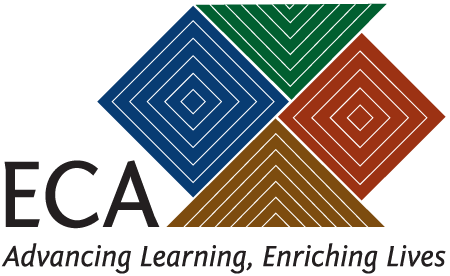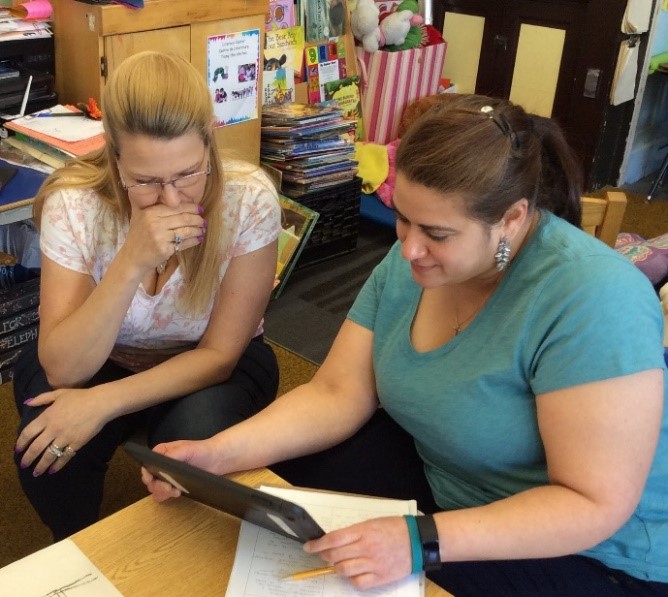Worcester Child Development Head Start: The Journey to Coaching
This month, Coaching Conversations features Worcester Child Development Head Start. ECA spoke with two coaches, Denise Nelson and Carmen Fernandez, and the Education Manager, Carlene Sherbourne, who developed the current coaching model. The model is based on the Practice Based Coaching approach with some adaptations based on her own research. Carlene described the coaching process, her successes and lessons learned. Denise and Carmen shared their coaching experiences.
For three years in her role as teacher, Denise received coaching. As she reflects,
I was a good teacher before [becoming a coach]. My coach pointed out aspects of my teaching that I missed. Coaching improved my practice tremendously. I became more intentional, and aware of many dimensions of teaching and learning.

Denise coaches a teacher
Denise began her coaching journey in 2014 as a half day teacher and a part time coach. Juggling the demands of both jobs became difficult; the position eventually evolved into a full time coaching role.
Now, I coach in two centers. On Monday, Wednesday, Friday I am in one building coaching in nine classrooms and Tuesday and Thursday, I coach in another center which has six classrooms.
Carmen, like Denise, was a Head Start teacher prior to her role as a coach. Her current position is slightly different than Denise’s role. She serves as a Center Coordinator Support in one school and coaches teachers at that school as well. What helps both coaches is the knowledge and experience gained as former Head Start teachers.
Criteria for Choosing Coaches
Carlene wanted to hire coaches with previous teaching experience; excellent interpersonal skills and the ability to empathize and build rapport with teachers. Candidates had to have at least a year of Head Start experience; a degree in Early Childhood Education and the interpersonal skills needed to develop a trusting relationship with the teachers. For Carlene, selecting Denise and Carmen was a relatively easy decision. Both had “strong skills, professionally”. “I just knew that they would be wonderful candidates and they proved me right,” she said.
The coaches are hardworking, creative and always bring something new to the table. They just blow me away with the ways in which they support our teachers. Consequently, the majority of our staff is heavily invested in the coaching program.
The Coaching Process
Coaching occurs weekly for about forty-five minutes and includes a reflection period. The coaching process is strength based. Teachers share what they are proud of, what they do well; then coaches and teachers work together to examine challenges or opportunities for change. They jointly engage in goal setting. The CLASS, Work Sampling Child Assessment data and ECERS inform goal setting and curriculum priorities. Videotaping is routinely used as a tool to examine instructional practices particularly the quality of teacher-child and child to child interactions as measured by the CLASS. Carlene works with the Curriculum Committee, families and other Head Start managers to create School Readiness Goals for children which is a primary content focus of coaching. Weekly coaching logs area maintained for each teacher. Two times yearly, coaches ask teachers to complete a survey that provides valuable information on the usefulness, effectiveness and impact of coaching.
Building rapport and trust with teachers are the keys to successful relationship building. Carlene said,
Coaches have to work from the ground level to build the trust that teachers demand. Teachers need to know that what is being said to the coaches will not be used against them. When you’re videotaping, the video is not going to be shown to a supervisor. It will just be used for reflection purposes. Once we hired the coaches, it took about six months to build that trust. Even though our coaches were established teachers, and the individuals they were coaching knew them well, for the first time they were seeing their colleagues in a different role. The reaction was “Why are you doing this? What’s your motivation?” I personally met with every staff person and talked about the coaching model. I shared with teachers the types of paper work that we both were responsible for maintaining, expressed our commitment to confidentiality and set the parameters for what would and would not be shared with the coordinator. In the upcoming year, we are going to focus on adult learning theory; how adults learn, and what this means for coaching.
Practicing Inclusiveness: Coaching Teaching Assistants
All lead teachers at Worcester Child Development Head Start are required to participate in coaching. In the interview, Denise shared a story about a particular teaching assistant who was intrigued and very interested in the coaching she saw teachers receiving. She took the initiative in finding out how she could have a coach. Her interest in coaching came as a surprise to Denise who was only coaching teachers at the time.
I was surprised that a teaching assistant [approached me and said]. “Can I get in on that? I see what you’re doing with my teacher and she’s really learning a lot from you.” How do you say no to that? Someone who comes to you with that request. So that’s how I started to work with some of the assistants and a lot of progress has been made with that, too.

Carmen videotapes a classroom interaction
Carlene plans to expand the coaching model for teaching assistants and bus monitors.
I’ve always wanted all education staff to be part of the coaching process. We knew that the teachers were receiving coaching and in some instances the coach works with both the teacher and teaching assistant as a team. This is a very powerful model. We have a group of classroom aid bus monitors and teaching assistant floats that I believe are called on to do some of the hardest work and are the ones that receive the least amount of training. Next year we are coming planning for a more inclusive coaching model.
Developing a Community of Practice Model
Carlene promotes a collaborative approach to learning where staff share their challenges, successes and strategies in a supportive environment. With this in mind, Carlene is working on a community of practice model for coaching. “The idea is to create goals individually but share those goals together in a group setting, and collaboratively work on strategies. This is a great way for staff to support each other when a coach isn’t available”, said Carlene.
Professional Development

Carmen coaches a teacher
They are committed to advancing the professionalism of all staff and this, in part, may be why coaching is so widely accepted in Worcester Head Start.
I keep an eye out for any coaching trainings that are available whether they are webinars or in-person trainings. I encourage coaches to attend and [we] provide release time, Carlene told us.
Administrative Support
Having administrative support plays a major role in the success of the coaching model at Worcester Child Development Head Start. Carlene feels fortunate to have an Executive Director, Laurie Kuczka, and an Assistant Director, Karen Waters, who believe in the coaching model.
This past February marks the 3rd year of implementing their coaching model. Carmen, Denise and Carlene all agree that the program is working. Teachers feel supported; they feel they have a voice. Over time, teachers have practiced independent self-reflection. The looks on teachers’ faces when they realize that children have met their readiness goals or improved CLASS scores is a priceless experience Denise and Carmen will remember forever.
Lessons Learned
There are many lessons that could be learned from the Worcester Child Development Head Start. We have listed a few here for any program that might be interested in starting a coaching model.
- Find coaches that believe in your program
- Build a relationship with teachers
- Understand that coaching is not punitive; it is not just for educators who are performing poorly, but to support all educators as they work to improve their practice
- Build in planning time for teachers
- Using video routinely as a coaching tool and being flexible on the ways teachers review and share video
- Coach all staff from a strength based approach
- Allocate ample time for debriefing coaching events that engage in deep reflection.
For more information about the Worcester Child Development Head Start program, contact Carlene Sherbourne, SherbourneC@worc.k12.ma.us .
Credits
Authors: Linda Warren & Esprene Liddell-Quintyn
Interviewers: Lisa Sullivan & Esprene Liddell-Quintyn
Photography: Carmen Fernandez & Denise Nelson

